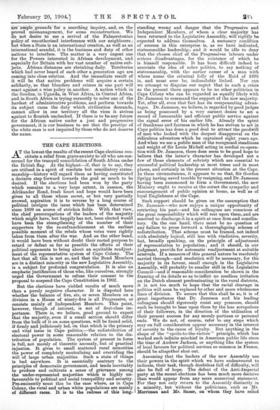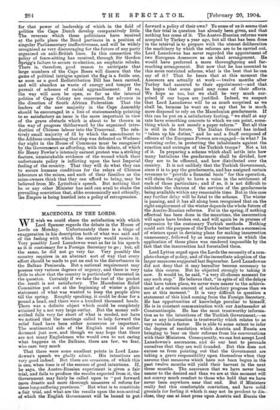AT the lowest the results of the recent Cape elections con-
stitute a, relief from grave anxiety to all who are con- cerned for the tranquil consolidation of South Africa under the British flag. At the highest—if, that is to say, they are utilised in a spirit of resolute but conciliatory states- manship—history will regard them as having constituted a decisive step forward towards the goal so much to be desired. If the elections had been won by the party which remains to a very large extent, in essence, the Afrikander Bond, fresh heart and hope would have been given to all those whose secret, or but very partially avowed, aspiration it is to reverse by a long course of political intrigue the issue which has been determined since 1899 on scores of stricken fields. With that view, the chief preoccupations of the leaders of the majority which might have, but happily has not, been elected would have been the strengthening of the number of their supporters by the re-enfranchisement at the earliest possible moment of the rebels whose votes were rightly taken from them after the war. And on the other hand, it would have been without doubt their rooted purpose to retard or defeat as far as possible the efforts of their political opponents to bring about an equitable readjust- ment of the representative system of Cape Colony. The fact that all this is not so, and that the Bond Members are in a distinct minority in the new Legislative Assembly, is a subject for profound congratulation. It is also an emphatic justification of those who, like ourselves, strongly urged the Government to refuse their consent to the proposal to suspend the Cape Constitution in 1902.
But the elections have yielded results of much more than a purely negative character. It is disputed here whether the balance of five, six, or seven Members on a division in a House of ninety-five is all Progressive, or consists mainly of Independent Members. This point, however, though of interest, is not of first-class im- portance. There is, we believe, good ground to expect that the majority, even if a small section should differ from the bulk of it on some questions, will be found solid, if firmly and judiciously led, chi that which is the primary and vital issue in Cape politics,—the redistribution of electoral power in some reasonable relation to the dis- tribution of population. The system at present in force is full, not merely of theoretic anomaly, but of practical injustice. It gives to small scattered rural minorities the power of completely neutralising and overriding the will of large urban majorities. Such a state of things is bad anywhere. It is essentially contrary to the principles of democratic government, and tends inevitably to produce and cultivate a sense of grievance among the under-represented majorities which is highly un- favourable to political and social tranquillity and security. Pre-eminently must this be the case where, as in Cape Colony, the rural and urban white populations are mainly of different races. It is to the redress of this long- standing wrong and danger that the Progressive and Independent Members, of whom a clear majority has been returned to the Legislative Assembly, will rightly be expected to address themselves. A necessary condition of success in this enterprise is, as we have indicated, statesmanlike leadership ; and it would be idle to deny that the chosen chief of the Progressives labours under serious disadvantages, for the existence of which he is himself responsible. It has been difficult indeed to associate the idea of sober politics, to say nothing of statesmanship, with the earlier career of a man with whose name the criminal folly of the Raid of 1895 is, and must ever be, indissolubly linked. Nor can we attempt to disguise our regret that in such a crisis as the present there appears to be no other politician in Cape Colony who can be regarded as equally likely with Dr. Jameson to command the support of the new majority. Yet, after all, even that fact has its compensating advan- tages. Dr. Jameson, we believe, is regarded by good judges as being possessed by a very earnest desire to set a record of honourable and efficient public service against the signal error of his earlier life. Already the spirit of frankness and fairness in which he has striven to act in Cape politics has done a good deal to attract the goodwill of men who looked with the deepest disapproval on the ridiculous adventure which he captained eight years ago. And when we see a public man of the recognised steadiness and weight of Sir Louis Michell acting in cordial co-opera- tion with Dr. Jameson, there does seem to be good hope to believe that the latter's character has developed not a few of those elements of sobriety which are essential to successful political leadership at most times and in most places, and certainly in the present situation at the Cape. In these circumstances, it appears to us that, Sir Gordon Sprigg having saved trouble by resigning, and Dr. Jameson having been summoned to form a Government, the new Ministry ought to receive at the outset the sympathy and encouragement of public opinion at home, as well as of loyal Englishmen at the Cape.
Such support should be given on the assumption that Dr. Jameson—who now enjoys a unique opportunity of retrieving his past—and his colleagues are conscious of the great responsibility which will rest upon them, and are resolved to discharge it in a spirit at once firm and concilia- tory. On the one hand, there must be no question of any failure to press forward a thoroughgoing scheme of redistribution. That scheme must be framed, not indeed with absolutely logical, still less with vindictive, severity, but, broadly speaking, on the principle of adjustment of representation to population ; and it should, in our judgment, provide for automatic readjustment at suitable intervals. If a measure of this general nature be resolutely carried through—and resolution will be necessary, for the majority in its favour, small enough in the Legislative Assembly, will probably be smaller still in the Legislative Council—and if reasonable consideration be shown in the framing of its details so as to inflict no needless irritation on the Dutch element predominating in the rural districts, it is not too much to hope that the racial cleavage in politics will soon be replaced by other and more wholesome lines of division. To secure that this shall be so, it is of great importance that Dr. Jameson and his leading colleagues should rigorously resist any pressure, should. such be brought to bear upon them by the less scrupulous of their followers, in the direction of the utilisation of their present success for any merely partisan or personal ends. We do not, of course, refer to any steps which may on full consideration appear necessary in the interest of security to the cause of loyalty. But anything in the shape of the " spoils-to-the-victors " principle, which has worked such infinite mischief in American public life since the time of Andrew Jackson, or anything like the system of local favours for political services so common in France, should. be altogether shut out.
Assuming that the leaders of the new Assembly use their powers in the spirit which we have endeavoured to indicate, their task, though doubtless full of difficulty, will also be full of hope. The defeat of the Anti-Imperial party at the recent elections has been much more decisive than would appear from any mere numerical statement. For they not only return to the Assembly distinctly in a minority, but without the politicians, such as Mr. Merriman and Mr. Saner, on whom they have relied for that power of leadership of which in the field of politics the Cape Dutch develop comparatively little. The reverses which these politicians have received at the polls place the Bond partisans in a position of singular Parliamentary ineffectiveness, and will be widely recognised as very discouraging for the future of any party sorganised on anti-British lines. In this connection the policy of fence-sitting has received, through Sir Gordon Sprigg's failure to secure re-election, an emphatic rebuke. There is, therefore, good reason to anticipate that large numbers of the Cape Boers will discern that the game of political intrigue against the flag is a futile one, as soon as a good Redistribution Bill has been carried, and will abandon as waste of energy and temper the pursuit of schemes of racial aggrandisement. If so, the way will soon be open, so far as the internal politics of Cape Colony are concerned, for advance in the direction of South African Federation. That the leaders of the new majority in the Cape Assembly should be encouraged in a line of statesmanship pointing to so satisfactory an issue is the more important in view of the grave obstacle which is about to be thrown in the way of progress thitherward by the organised intro- duction of Chinese labour into the Transvaal. The rela- tively small majority of 51 by which the amendment to the Address condemning that step was defeated on Wednes- day night in the House of Commons must be recognised by the Government as affording, with the debate, of which Sir Henry Fowler's intensely earnest protest was a striking feature, unmistakable evidence of the wound which their unfortunate policy is inflicting upon the best Imperial feeling of the country. That they will do what they can to secure humane conditions for the relays of Chinese labourers at the mines, and such of their families as the mine-owners think that they can afford to bring, may be believed from Mr. Lyttelton's speech. But nothing that he or any other Minister has said can avail to shake the prevailing conviction that, alike economically and ethically, the Empire is being hustled into a policy of retrogression.











































 Previous page
Previous page